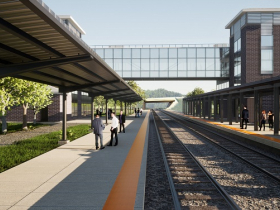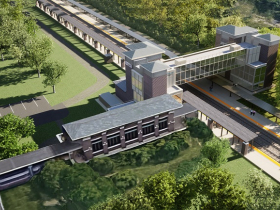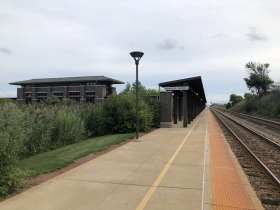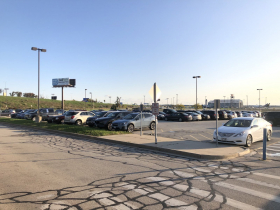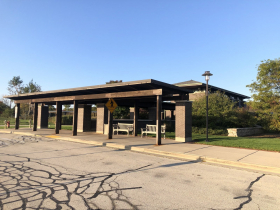Airport Train Station Expansion Underway
Its construction will help expand Amtrak Hiawatha. Plus: Recap of the week's real estate news.
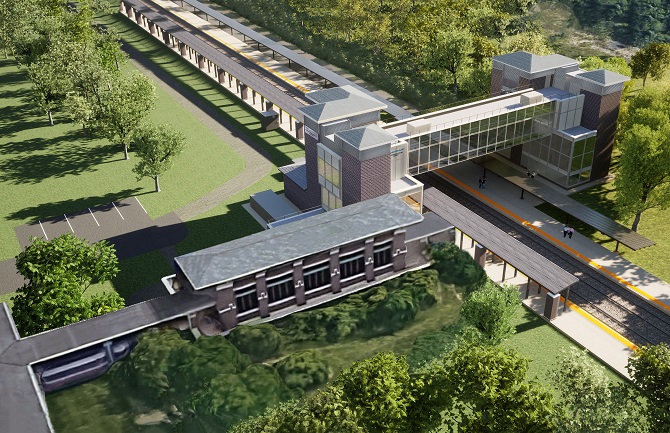
Milwaukee Airport Railroad Station expansion. Rendering from Wisconsin Department of Transportation.
Construction is underway on a major expansion of Milwaukee’s secondary train station.
A second platform is being added to Milwaukee Airport Rail Station (MARS), one of a handful of improvements necessary to increase the frequency of Amtrak Hiawatha Service trains between Milwaukee and Chicago.
Zenith Tech received a $17.2 million construction contract to build an 800-foot-long concrete platform, elevator towers, a skywalk across the two-track rail line and a host of improvements to the surrounding track. After years of planning, construction started this month.
The expanded station will offer a key operational efficiency: trains will be able to stop on either of the two tracks. The 14 trains per day that currently stop at the station can only do so on the eastern track. That single-side stopping creates an operational bottleneck when scheduling the faster passenger trains around slower, longer freight trains.
While the station is owned by the Wisconsin Department of Transportation (WisDOT), the rail line is owned by Canadian Pacific Kansas City (CPKC). The railroad will allow an additional round trip on its tracks in exchange for a series of infrastructure upgrades, including the new platform and two projects near Milwaukee Intermodal Station. An earlier agreement to allow three additional round trips is on hold after Illinois canceled plans in 2019 to build a holding siding for freight trains in the Chicago suburbs.
MARS is located at 5601 S. 6th St., on the western edge of the Milwaukee Mitchell International Airport grounds. But despite its airport name and proximity, the station’s primary audience is residents that live south of Downtown and are looking to get to Chicago. The station’s large surface parking lot and proximity to the airport freeway spur make it a convenient alternative for those that would otherwise drive to Milwaukee Intermodal Station.
For those that do make the train-plane connection, there is a shuttle bus that operates between the station and airport. Expanding the frequency of the Hiawatha could make it more appealing for Illinois or southern Wisconsin residents to use the train-plane link because waiting times would be shorter.
WisDOT is awaiting a second federal grant to execute the Muskego Yard bypass project, which would route freight trains away from the Milwaukee Intermodal Station. Securing that grant is necessary to add the eighth daily Hiawatha roundtrip. The project involves creating a new two-track mainline track through CPKC’s Muskego Yard in the Menomonee Valley, allowing trains with double-stacked shipping containers to avoid the downtown train station. Cost increases on the project, including from inflation and bridge replacements, caused WisDOT to pursue a second grant. It originally won a $26.6 million grant in 2020 for what was to be a $55 million project.
The other project to enable the eighth daily train, $5.4 million in signalization improvements near the downtown station, is already funded. WisDOT secured a $2.7 million federal grant in 2019 to fund the effort, which will allow passenger and freight trains to operate at higher speeds.
“The infrastructure is really meant for future [CPKC] growth,” said Lisa Stern, chief of railroads and harbors for WisDOT, on March 1 to the City of Milwaukee Public Transportation, Utilities and Waterways Review Board. Through a web of federal regulations, host railroads are able to demand infrastructure improvements that primarily benefit their operations in order to allow expanded passenger rail service. The CPKC mainline between downtown Milwaukee and the Illinois border is among the most heavily used rail corridors in Wisconsin.
The Sturtevant station, the only other Wisconsin station used by the Hiawatha, already has a two-platform setup similar to what is being built near the airport. MARS originally opened in 2005. The current Sturtevant station opened in 2006. WisDOT received a $5 million federal grant to fund the MARS expansion in 2019.
When the MARS expansion is completed in 2025, riders will have new destinations to choose from. A new passenger train is anticipated to begin operation later this year or in 2024. Referred to as the Twin Cities-Milwaukee-Chicago (TCMC) in planning documents, the line is now being called the Great River route. It will add a second daily round trip between the three metropolitan areas, augmenting the existing Amtrak Empire Builder that operates between Chicago and the Pacific Northwest. The TCMC will function as an extension of the Hiawatha, with a train from Chicago to Milwaukee continuing on to St. Paul. The current Empire Builder does not stop at MARS nor Sturtevant.
WisDOT is seeking additional federal grants, funded by the Bipartisan Infrastructure Law, to extend the Hiawatha to Green Bay and Madison and increase the frequency of the TCMC train.
As part of a separate, Amtrak-led process, new passenger cars are being added to the Hiawatha, replacing 1980s equipment. But Amtrak as a whole is facing an equipment shortage which is currently limiting the length of Hiawatha trains even as ridership rebounds from a pandemic slowdown.
Additional information on the MARS project is available on the WisDOT website.
Renderings
Photos
Weekly Recap
Gov. Evers Signs Five Bipartisan Affordable Housing Bills
Gov. Tony Evers signed five bills into law Thursday that are aimed at increasing Wisconsin’s housing stock as a lack of supply continues to make housing scarce across the state.
The bipartisan bills create or expand a number of loan programs through the Wisconsin Housing and Economic Development Authority (WHEDA). The product of negotiations between the Evers administration, developers, home builders, municipalities and Republican legislators, the bills’ enactment continues a string of successful legislative action in the state’s divided government.
Earlier this week, Evers signed into law legislation to increase the funding municipalities receive from the state and rebuild deteriorating agricultural roads.
In much of Wisconsin, the construction of new housing never recovered from the 2008 housing crash, creating a gap between what municipalities needed to build in order to keep up with growth and what was actually done. The state’s 20 largest counties have been underproducing housing units, apartment units and single family homes, as demand has continued to go up. Data from UW-Madison professor Kurt Paulsen showed that the state’s largest counties have built 26,000 fewer units than they needed to over the last 15 years and that most of the state’s largest job centers have more jobs than housing units available.
Milwaukee Wins $14 Million Grant To Rebuild, Reimagine Villard Avenue
The City of Milwaukee will receive a $14.3 million federal grant to redesign W. Villard Avenue on the city’s North Side.
U.S. Senator Tammy Baldwin announced the grant award Friday afternoon in a press release, noting that it would include a Complete Streets vision for the commercial street.
“Improvements include raised bike lanes, raised intersections, curb extensions, bus bulbs, lighting and signal improvements, a pedestrian plaza, and other streetscaping enhancements,” said the senator.
The award is one of three Baldwin announced that Wisconsin would receive as part of the U.S. Department of Transportation‘s RAISE program. The annual discretionary grant program, formerly known as TIGER, recently saw its funding increased by the Bipartisan Infrastructure Law.
Harambee Block Transformed By New Buildings
Milwaukee Habitat for Humanity and Crown Court Properties are giving new life to a full block in Harambee and closing the book on a failed 1970s urban renewal scheme that left most of the block, and several others nearby, vacant for several decades.
The block, bounded by W. Concordia Avenue, W. Ring Street, N. 5th Street and N. 6th Street, was nearly entirely cleared in the 1970s for a senior housing development that refilled only a portion of the site. A series of homes facing N. 5th St. were demolished in the following decades, with the city ending up owning most of the lots through property tax foreclosure.
In 2022, Crown Court completed a three-story, 13-unit apartment building, 540 W. Ring St., at the southwest corner of the block. It serves as an extension of the seniors-only, 62-unit Park Hill Apartments, 535 W. Concordia Ave., that the firm previously acquired.
The senior housing building was constructed in 1978 as Camilla Court, but rehabilitated in 2005 through the low-income housing tax credit program and rebranded Park Hill, reflecting the steep grade of the block.
Brew City Match Helps More Than 20 Businesses
There’s a whole new class of new and existing small businesses that LISC Milwaukee is working to grow.
The nonprofit organization revamped its Brew City Match program, targeted at growing minority-owned businesses in the city’s historic commercial corridors and announced a new cohort of awardees Wednesday.
More than 20 awardees will receive business coaching, mentorship and up to $100,000 in financial support, which can be used on marketing, construction, preconstruction, inventory equipment and up to three months of lease payments.
The program, initially launched in 2019, previously included a series of different award categories targeted at businesses and property owners in different stages of their evolution. A handful of applicants progressed from one phase to the next. The new formula offers substantially more financial support and eliminates the different levels in favor of a more flexible approach.
New Oil Pipeline Planned Through Milwaukee’s South Side
A new, six-mile pipeline through Milwaukee and two suburban communities is part of a $45 million plan to eliminate 25,000 truck trips annually and lower the price of gas in northeast Wisconsin.
U.S. Energy, formerly U.S. Oil, is pursuing construction of the pipeline as part of a larger plan to transport “refined fuel” by barge from Milwaukee to Green Bay, replacing a 120-mile pipeline that was shuttered in 2016.
“It currently takes 92 tanker truck trips daily to meet consumer demand, which not only negatively impacts regional traffic and infrastructure, but also impacts fuel costs,” said Mercedes Bereza, vice president of marketing for U.S. Energy parent U.S. Venture.
The new pipeline would connect a tank farm and terminal at 1701 E. College Ave., across from Milwaukee Mitchell International Airport, with the Port of Milwaukee. From U.S. Energy’s existing port facilities, the fuel would be loaded onto barges and transported via Lake Michigan.
Two of Milwaukee’s Largest Corporate Landlords Selling Their Houses, With Wildly Different Results
Three large, private equity-backed corporate landlords operate in Milwaukee’s house rental market. All three began buying lots of Milwaukee houses in 2018 or 2019, and they ended 2022 owning just shy of 1,500 homes in total. The largest, VineBrook Homes, bought over 450 houses in Milwaukee last year, according to city property records.
But all three companies mostly ceased buying houses by late 2022, and in fact, two of the three have spent early 2023 selling houses. One of the companies, SFR3, has made double the money it spent to buy those properties. The other company, VineBrook, has actually lost money on these transactions. The third company, Highgrove Holdings, ended its buying spree months before the other two, but hasn’t sold anything recently.
The different trajectories of these three companies give clues to their financial health, business strategy and potential consequences they may have on Milwaukee neighborhoods.
In some ways, SFR3 and VineBrook follow similar business models. Both are private companies that raise money by selling securities to qualified investors. Over the past few years, each has bought thousands of cheap houses across cities in the Midwest and South.
Will Unique Downtown Mural Be Saved?
The ceramic tile mural, People Helping People, has been on display at the entrance to the building at 803 W. Michigan St. for over half a century. A new development known as the Iron District, featuring a hotel, apartments, and professional soccer stadium, calls for transforming the office building into a larger apartment complex. The future of the mural, however, is not certain.
What is likely to be disassembled and reinstalled is a 10’ x 20’ artwork designed by Chicago-based artist Edward Cathony. The Milwaukee Insurance Company commissioned the painter to design this mural in their outdoor lobby after they refurbished the building in 1969.
How the painter from Illinois was even considered for such a project was due to Huetta Manion, owner of Landmarks Gallery (1966-2020) at 231 N. 76th St. She was a pioneer in woman-owned art galleries and helped Cathony receive a number of commissions painting watercolor graphics of Milwaukee landmarks in 1969, including the War Memorial Center, City Hall, Marquette University, and many others.
The artwork Cathony created for the Milwaukee Insurance Co. was titled People Helping People, and for the company was a proud display of their philosophy. Three years after the mural was completed, the company’s director of marketing Wilbert Kedrow wrote in a letter to Cathony, “We believe your mural on the building … has continued to enhance us as an institution in the world of the arts and city beautification.”
Northridge Mall Lawsuit Keeps Dragging On
The City of Milwaukee’s quest to see the long-vacant Northridge Mall demolished will continue to be held up in court until at least September, if not longer.
Even Judge William Sosnay, who in August 2022 promised to bring the matter to a resolution, acknowledged the legal proceedings have become slow-moving.
“The light is still green and I still have my foot on the gas pedal, even if I might be moving 20 miles per hour,” said Sosnay on Tuesday morning. Meanwhile, new issues including a potential buyer and legal challenges over record requests continue to crop up.
Sosnay, in October, did his part to get the ball rolling. After inheriting the case, he ruled the city’s 2019 raze order was valid given the property’s condition. But the mall’s Chinese ownership group, U.S. Black Spruce Enterprise Group, is challenging that order in appeals court. Black Spruce is due to respond to the city’s brief by July 25, which would allow the court to rule on the appeal.
Troubled Apartment Complex Paying Tenants To End Leases
Nearly three months after they were evacuated because of environmental contamination issues, residents still don’t know when they will be allowed to move back into The Community Within The Corridor (CWC) development at N. 32nd Street and W. Center Street. But they’re now being offered thousands of dollars to stop waiting.
Meanwhile, a class-action lawsuit was filed in Milwaukee County Circuit Court that accuses the development team of actively misleading the Wisconsin Department of Natural Resources (DNR) and rushing residents into the building that had known environmental issues.
The approximately 150 residents of the eastern half of the CWC complex were evacuated on March 25 by the Milwaukee Health Department (MHD) after documentation submitted to the DNR showed several areas of the building had elevated levels of an airborne carcinogen known to cause heart defects and other disorders in unborn children and cancer for children and adults subject to long-term exposure. The first residents had only moved into that part of the 197-unit property, the largest private affordable housing complex in Wisconsin, in December.
The development team, led by Minnesota-based Roers Companies, is now offering the displaced residents up to $5,000 per household to terminate their leases. It’s also moving to stop paying displaced residents to live in a series of hotels. Tenants have until June 23 to sign the lease termination agreement and the company plans to end food, transportation and housing stipends on July 14.
Midtown Vacant Lot To Become Substance Abuse Treatment Center
A residential treatment facility for males battling substance abuse issues will expand under a proposal endorsed Tuesday by a Common Council committee.
Serenity Inns would purchase two vacant lots at N. 28th St. and W. Brown St. to develop a 14-bed, $2.4 million facility.
The nonprofit operates a transitional living facility across the street at 2825 W. Brown St.
“What would be different about this facility is it would be residential, evidence-based treatment,” said Serenity CEO Kenneth Ginlack, Sr. to the Zoning, Neighborhoods & Development Committee. Patients in the new facility would qualify for Medicaid billing and stay for longer periods of time.
If you think stories like this are important, become a member of Urban Milwaukee and help support real, independent journalism. Plus you get some cool added benefits.
Plats and Parcels
-
New Third Ward Tower Will Be Milwaukee’s Priciest
 Mar 3rd, 2024 by Jeramey Jannene
Mar 3rd, 2024 by Jeramey Jannene
-
New Corporate Headquarters, 130 Jobs For Downtown
 Feb 25th, 2024 by Jeramey Jannene
Feb 25th, 2024 by Jeramey Jannene
-
A Four-Way Preservation Fight Over Wisconsin Avenue
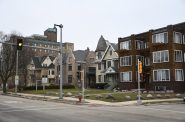 Feb 18th, 2024 by Jeramey Jannene
Feb 18th, 2024 by Jeramey Jannene
Transportation
-
MCTS Adds 28 New Buses
 Jul 13th, 2024 by Graham Kilmer
Jul 13th, 2024 by Graham Kilmer
-
MCTS Designing New Bus Shelters
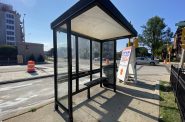 Jul 10th, 2024 by Graham Kilmer
Jul 10th, 2024 by Graham Kilmer
-
MCTS Updates RNC Bus Detours To Better Serve Downtown, Riders
 Jul 9th, 2024 by Jeramey Jannene
Jul 9th, 2024 by Jeramey Jannene


